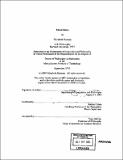Moral Status
Author(s)
Harman, Elizabeth, 1975-
DownloadFull printable version (7.993Mb)
Other Contributors
Massachusetts Institute of Technology. Dept. of Linguistics and Philosophy.
Advisor
Joshua Cohen.
Terms of use
Metadata
Show full item recordAbstract
Chapters One through Three present the following view: (i) I explain moral status as follows: something has moral status just in case we have reasons not to cause harms to it simply in virtue of the badness of the harms for it. (ii) Moral status is not a matter of degree. (iii) A living thing has moral status just in case it is ever conscious. (iv) If something has moral status, then the strength of a moral reason not to harm it is proportional to the severity of the harm. In this view, all humans and animals that are ever conscious have moral status. Future consciousness is sufficient for present moral status. An embryo of any species that will actually be conscious in the future, presently has moral status. Living humans who were conscious but are not and never will be again do have moral status. Any being that dies before it is ever conscious lacks moral status, regardless of its potential. Mere potentiality to be a person is not sufficient for moral status. However, a being's potential future affects the severity of certain harms. There are stronger reasons to avoid causing the deaths of humans than to avoid causing the deaths of cats, because humans lose more in death than cats do. Chapters One through Three present the above view. I argue that this view can resolve certain apparent tensions within two different attractive combinations of views, and on this basis I argue that the above view should be adopted. (cont.) Chapter Four, "Can We Harm and Benefit in Creating?" proposes a solution to the puzzle of actions that appear to be wrong in virtue of harming a particular individual, but where the individual would not have existed if the action had not been performed, so the individual is not made worse off by the action. Chapter Five, "Ethics Without Ethical Theory," defends part of the methodology of Chapters One through Four by defending the view that we can justifiably reach important substantive ethical conclusions without commitment to a particular ethical theory, or to a particular meta-ethical view.
Description
Thesis (Ph. D.)--Massachusetts Institute of Technology, Dept. of Linguistics and Philosophy, 2003. Includes bibliographical references.
Date issued
2003Department
Massachusetts Institute of Technology. Department of Linguistics and PhilosophyPublisher
Massachusetts Institute of Technology
Keywords
Linguistics and Philosophy.